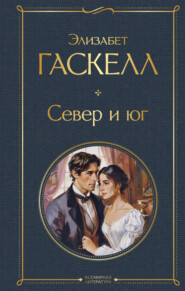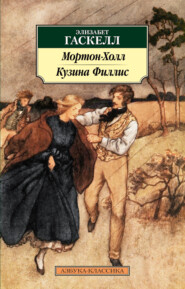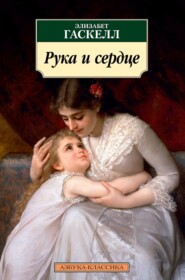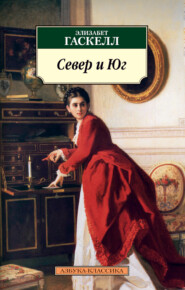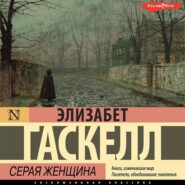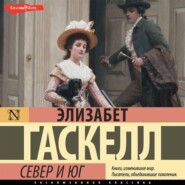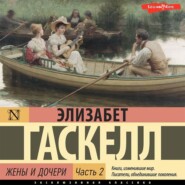По всем вопросам обращайтесь на: info@litportal.ru
(©) 2003-2024.
✖
The Grey Woman and other Tales
Настройки чтения
Размер шрифта
Высота строк
Поля
"No; bring supper quickly; that is all I want."
Her quiet, sad eyes met mine for a moment; but I saw no change in their expression, as if I had vexed her by my rudeness: her countenance did not for an instant lose its look of patient sense, and that is pretty nearly all I can remember of Thekla that first evening at Heppenheim.
I suppose I ate my supper, or tried to do so, at any rate; and I must have gone to bed, for days after I became conscious of lying there, weak as a new-born babe, and with a sense of past pain in all my weary limbs. As is the case in recovering from fever, one does not care to connect facts, much less to reason upon them; so how I came to be lying in that strange bed, in that large, half-furnished room; in what house that room was; in what town, in what country, I did not take the trouble to recal. It was of much more consequence to me then to discover what was the well-known herb that gave the scent to the clean, coarse sheets in which I lay. Gradually I extended my observations, always confining myself to the present. I must have been well cared-for by some one, and that lately, too, for the window was shaded, so as to prevent the morning sun from coming in upon the bed; there was the crackling of fresh wood in the great white china stove, which must have been newly replenished within a short time.
By-and-by the door opened slowly. I cannot tell why, but my impulse was to shut my eyes as if I were still asleep. But I could see through my apparently closed eyelids. In came, walking on tip-toe, with a slow care that defeated its object, two men. The first was aged from thirty to forty, in the dress of a Black Forest peasant, – old-fashioned coat and knee-breeches of strong blue cloth, but of a thoroughly good quality; he was followed by an older man, whose dress, of more pretension as to cut and colour (it was all black), was, nevertheless, as I had often the opportunity of observing afterwards, worn threadbare.
Their first sentences, in whispered German, told me who they were: the landlord of the inn where I was lying a helpless log, and the village doctor who had been called in. The latter felt my pulse, and nodded his head repeatedly in approbation. I had instinctively known that I was getting better, and hardly cared for this confirmation; but it seemed to give the truest pleasure to the landlord, who shook the hand of the doctor, in a pantomime expressive of as much thankfulness as if I had been his brother. Some low-spoken remarks were made, and then some question was asked, to which, apparently, my host was unable to reply. He left the room, and in a minute or two returned, followed by Thekla, who was questioned by the doctor, and replied with a quiet clearness, showing how carefully the details of my illness had been observed by her. Then she left the room, and, as if every minute had served to restore to my brain its power of combining facts, I was suddenly prompted to open my eyes, and ask in the best German I could muster what day of the month it was; not that I clearly remembered the date of my arrival at Heppenheim, but I knew it was about the beginning of September.
Again the doctor conveyed his sense of extreme satisfaction in a series of rapid pantomimic nods, and then replied in deliberate but tolerable English, to my great surprise, —
"It is the 29th of September, my dear sir. You must thank the dear God. Your fever has made its course of twenty-one days. Now patience and care must be practised. The good host and his household will have the care; you must have the patience. If you have relations in England, I will do my endeavours to tell them the state of your health."
"I have no near relations," said I, beginning in my weakness to cry, as I remembered, as if it had been a dream, the days when I had father, mother, sister.
"Chut, chut!" said he; then, turning to the landlord, he told him in German to make Thekla bring me one of her good bouillons; after which I was to have certain medicines, and to sleep as undisturbedly as possible. For days, he went on, I should require constant watching and careful feeding; every twenty minutes I was to have something, either wine or soup, in small quantities.
A dim notion came into my hazy mind that my previous husbandry of my fifty pounds, by taking long walks and scanty diet, would prove in the end very bad economy; but I sank into dozing unconsciousness before I could quite follow out my idea. I was roused by the touch of a spoon on my lips; it was Thekla feeding me. Her sweet, grave face had something approaching to a mother's look of tenderness upon it, as she gave me spoonful after spoonful with gentle patience and dainty care: and then I fell asleep once more. When next I wakened it was night; the stove was lighted, and the burning wood made a pleasant crackle, though I could only see the outlines and edges of red flame through the crevices of the small iron door. The uncurtained window on my left looked into the purple, solemn night. Turning a little, I saw Thekla sitting near a table, sewing diligently at some great white piece of household work. Every now and then she stopped to snuff the candle; sometimes she began to ply her needle again immediately; but once or twice she let her busy hands lie idly in her lap, and looked into the darkness, and thought deeply for a moment or two; these pauses always ended in a kind of sobbing sigh, the sound of which seemed to restore her to self-consciousness, and she took to her sewing even more diligently than before. Watching her had a sort of dreamy interest for me; this diligence of hers was a pleasant contrast to my repose; it seemed to enhance the flavour of my rest. I was too much of an animal just then to have my sympathy, or even my curiosity, strongly excited by her look of sad remembrance, or by her sighs.
After a while she gave a little start, looked at a watch lying by her on the table, and came, shading the candle by her hand, softly to my bedside. When she saw my open eyes she went to a porringer placed at the top of the stove, and fed me with soup. She did not speak while doing this. I was half aware that she had done it many times since the doctor's visit, although this seemed to be the first time that I was fully awake. She passed her arm under the pillow on which my head rested, and raised me a very little; her support was as firm as a man's could have been. Again back to her work, and I to my slumbers, without a word being exchanged.
It was broad daylight when I wakened again; I could see the sunny atmosphere of the garden outside stealing in through the nicks at the side of the shawl hung up to darken the room – a shawl which I was sure had not been there when I had observed the window in the night. How gently my nurse must have moved about while doing her thoughtful act!
My breakfast was brought me by the hostess; she who had received me on my first arrival at this hospitable inn. She meant to do everything kindly, I am sure; but a sick room was not her place; by a thousand little mal-adroitnesses she fidgeted me past bearing; her shoes creaked, her dress rustled; she asked me questions about myself which it irritated me to answer; she congratulated me on being so much better, while I was faint for want of the food which she delayed giving me in order to talk. My host had more sense in him when he came in, although his shoes creaked as well as hers. By this time I was somewhat revived, and could talk a little; besides, it seemed churlish to be longer without acknowledging so much kindness received.
"I am afraid I have been a great trouble," said I. "I can only say that I am truly grateful."
His good broad face reddened, and he moved a little uneasily.
"I don't see how I could have done otherwise than I – than we, did," replied he, in the soft German of the district. "We were all glad enough to do what we could; I don't say it was a pleasure, because it is our busiest time of year, – but then," said he, laughing a little awkwardly, as if he feared his expression might have been misunderstood, "I don't suppose it has been a pleasure to you either, sir, to be laid up so far from home."
"No, indeed."
"I may as well tell you now, sir, that we had to look over your papers and clothes. In the first place, when you were so ill I would fain have let your kinsfolk know, if I could have found a clue; and besides, you needed linen."
"I am wearing a shirt of yours though," said I, touching my sleeve.
"Yes, sir!" said he again, reddening a little. "I told Thekla to take the finest out of the chest; but I am afraid you find it coarser than your own."
For all answer I could only lay my weak hand on the great brown paw resting on the bed-side. He gave me a sudden squeeze in return that I thought would have crushed my bones.
"I beg your pardon, sir," said he, misinterpreting the sudden look of pain which I could not repress; "but watching a man come out of the shadow of death into life makes one feel very friendly towards him."
"No old or true friend that I have had could have done more for me than you, and your wife, and Thekla, and the good doctor."
"I am a widower," said he, turning round the great wedding-ring that decked his third finger. "My sister keeps house for me, and takes care of the children, – that is to say, she does it with the help of Thekla, the house-maiden. But I have other servants," he continued. "I am well to do, the good God be thanked! I have land, and cattle, and vineyards. It will soon be our vintage-time, and then you must go and see my grapes as they come into the village. I have a 'chasse', too, in the Odenwald; perhaps one day you will be strong enough to go and shoot the 'chevreuil' with me."
His good, true heart was trying to make me feel like a welcome guest. Some time afterwards I learnt from the doctor that – my poor fifty pounds being nearly all expended – my host and he had been brought to believe in my poverty, as the necessary examination of my clothes and papers showed so little evidence of wealth. But I myself have but little to do with my story; I only name these things, and repeat these conversations, to show what a true, kind, honest man my host was. By the way, I may as well call him by his name henceforward, Fritz Müller. The doctor's name, Wiedermann.
I was tired enough with this interview with Fritz Müller; but when Dr. Wiedermann came he pronounced me to be much better; and through the day much the same course was pursued as on the previous one: being fed, lying still, and sleeping, were my passive and active occupations. It was a hot, sunshiny day, and I craved for air. Fresh air does not enter into the pharmacopœia of a German doctor; but somehow I obtained my wish. During the morning hours the window through which the sun streamed – the window looking on to the front court – was opened a little; and through it I heard the sounds of active life, which gave me pleasure and interest enough. The hen's cackle, the cock's exultant call when he had found the treasure of a grain of corn, – the movements of a tethered donkey, and the cooing and whirring of the pigeons which lighted on the window-sill, gave me just subjects enough for interest. Now and then a cart or carriage drove up, – I could hear them ascending the rough village street long before they stopped at the "Halbmond," the village inn. Then there came a sound of running and haste in the house; and Thekla was always called for in sharp, imperative tones. I heard little children's footsteps, too, from time to time; and once there must have been some childish accident or hurt, for a shrill, plaintive little voice kept calling out, "Thekla, Thekla, liebe Thekla." Yet, after the first early morning hours, when my hostess attended on my wants, it was always Thekla who came to give me my food or my medicine; who redded up my room; who arranged the degree of light, shifting the temporary curtain with the shifting sun; and always as quietly and deliberately as though her attendance upon me were her sole work. Once or twice my hostess came into the large eating-room (out of which my room opened), and called Thekla away from whatever was her occupation in my room at the time, in a sharp, injured, imperative whisper. Once I remember it was to say that sheets were wanted for some stranger's bed, and to ask where she, the speaker, could have put the keys, in a tone of irritation, as though Thekla were responsible for Fräulein Müller's own forgetfulness.
Night came on; the sounds of daily life died away into silence; the children's voices were no more heard; the poultry were all gone to roost; the beasts of burden to their stables; and travellers were housed. Then Thekla came in softly and quietly, and took up her appointed place, after she had done all in her power for my comfort. I felt that I was in no state to be left all those weary hours which intervened between sunset and sunrise; but I did feel ashamed that this young woman, who had watched by me all the previous night, and for aught I knew, for many before, and had worked hard, been run off her legs, as English servants would say, all day long, should come and take up her care of me again; and it was with a feeling of relief that I saw her head bend forwards, and finally rest on her arms, which had fallen on the white piece of sewing spread before her on the table. She slept; and I slept. When I wakened dawn was stealing into the room, and making pale the lamplight. Thekla was standing by the stove, where she had been preparing the bouillon I should require on wakening. But she did not notice my half-open eyes, although her face was turned towards the bed. She was reading a letter slowly, as if its words were familiar to her, yet as though she were trying afresh to extract some fuller or some different meaning from their construction. She folded it up softly and slowly, and replaced it in her pocket with the quiet movement habitual to her. Then she looked before her, not at me, but at vacancy filled up by memories; and as the enchanter brought up the scenes and people which she saw, but I could not, her eyes filled with tears – tears that gathered almost imperceptibly to herself as it would seem – for when one large drop fell on her hands (held slightly together before her as she stood) she started a little, and brushed her eyes with the back of her hand, and then came towards the bed to see if I was awake. If I had not witnessed her previous emotion, I could never have guessed that she had any hidden sorrow or pain from her manner; tranquil, self-restrained as usual. The thought of this letter haunted me, especially as more than once I, wakeful or watchful during the ensuing nights, either saw it in her hands, or suspected that she had been recurring to it from noticing the same sorrowful, dreamy look upon her face when she thought herself unobserved. Most likely every one has noticed how inconsistently out of proportion some ideas become when one is shut up in any place without change of scene or thought. I really grew quite irritated about this letter. If I did not see it, I suspected it lay perdu in her pocket. What was in it? Of course it was a love-letter; but if so, what was going wrong in the course of her love? I became like a spoilt child in my recovery; every one whom I saw for the time being was thinking only of me, so it was perhaps no wonder that I became my sole object of thought; and at last the gratification of my curiosity about this letter seemed to me a duty that I owed to myself. As long as my fidgety inquisitiveness remained ungratified, I felt as if I could not get well. But to do myself justice, it was more than inquisitiveness. Thekla had tended me with the gentle, thoughtful care of a sister, in the midst of her busy life. I could often hear the Fräulein's sharp voice outside blaming her for something that had gone wrong; but I never heard much from Thekla in reply. Her name was called in various tones by different people, more frequently than I could count, as if her services were in perpetual requisition, yet I was never neglected, or even long uncared-for. The doctor was kind and attentive; my host friendly and really generous; his sister subdued her acerbity of manner when in my room, but Thekla was the one of all to whom I owed my comforts, if not my life. If I could do anything to smooth her path (and a little money goes a great way in these primitive parts of Germany), how willingly would I give it? So one night I began – she was no longer needed to watch by my bedside, but she was arranging my room before leaving me for the night —
"Thekla," said I, "you don't belong to Heppenheim, do you?"
She looked at me, and reddened a little.
"No. Why do you ask?"
"You have been so good to me that I cannot help wanting to know more about you. I must needs feel interested in one who has been by my side through my illness as you have. Where do your friends live? Are your parents alive?"
All this time I was driving at the letter.
"I was born at Altenahr. My father is an innkeeper there. He owns the 'Golden Stag.' My mother is dead, and he has married again, and has many children."
"And your stepmother is unkind to you," said I, jumping to a conclusion.
"Who said so?" asked she, with a shade of indignation in her tone. "She is a right good woman, and makes my father a good wife."
"Then why are you here living so far from home?"
Now the look came back to her face which I had seen upon it during the night hours when I had watched her by stealth; a dimming of the grave frankness of her eyes, a light quiver at the corners of her mouth. But all she said was, "It was better."
Somehow, I persisted with the wilfulness of an invalid. I am half ashamed of it now.
"But why better, Thekla? Was there – " How should I put it? I stopped a little, and then rushed blindfold at my object: "Has not that letter which you read so often something to do with your being here?"
She fixed me with her serious eyes till I believe I reddened far more than she; and I hastened to pour out, incoherently enough, my conviction that she had some secret care, and my desire to help her if she was in any trouble.
"You cannot help me," said she, a little softened by my explanation, though some shade of resentment at having been thus surreptitiously watched yet lingered in her manner. "It is an old story; a sorrow gone by, past, at least it ought to be, only sometimes I am foolish" – her tones were softening now – "and it is punishment enough that you have seen my folly."
"If you had a brother here, Thekla, you would let him give you his sympathy if he could not give you his help, and you would not blame yourself if you had shown him your sorrow, should you? I tell you again, let me be as a brother to you."
"In the first place, sir" – this "sir" was to mark the distinction between me and the imaginary brother – "I should have been ashamed to have shown even a brother my sorrow, which is also my reproach and my disgrace." These were strong words; and I suppose my face showed that I attributed to them a still stronger meaning than they warranted; but honi soit qui mal y pense– for she went on dropping her eyes and speaking hurriedly.
"My shame and my reproach is this: I have loved a man who has not loved me" – she grasped her hands together till the fingers made deep white dents in the rosy flesh – "and I can't make out whether he ever did, or whether he did once and is changed now; if only he did once love me, I could forgive myself."
With hasty, trembling hands she began to rearrange the tisane and medicines for the night on the little table at my bed-side. But, having got thus far, I was determined to persevere.
"Thekla," said I, "tell me all about it, as you would to your mother, if she were alive. There are often misunderstandings which, never set to rights, make the misery and desolation of a life-time."
She did not speak at first. Then she pulled out the letter, and said, in a quiet, hopeless tone of voice: —
"You can read German writing? Read that, and see if I have any reason for misunderstanding."
The letter was signed "Franz Weber," and dated from some small town in Switzerland – I forget what – about a month previous to the time when I read it. It began with acknowledging the receipt of some money which had evidently been requested by the writer, and for which the thanks were almost fulsome; and then, by the quietest transition in the world, he went on to consult her as to the desirability of his marrying some girl in the place from which he wrote, saying that this Anna Somebody was only eighteen and very pretty, and her father a well-to-do shopkeeper, and adding, with coarse coxcombry, his belief that he was not indifferent to the maiden herself. He wound up by saying that, if this marriage did take place, he should certainly repay the various sums of money which Thekla had lent him at different times.
I was some time in making out all this. Thekla held the candle for me to read it; held it patiently and steadily, not speaking a word till I had folded up the letter again, and given it back to her. Then our eyes met.






